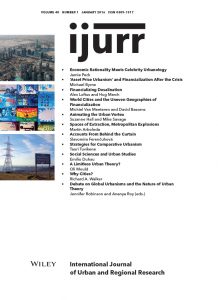Through an exploration of the political economy of the current commodity boom in Latin America, and on the basis of recent appropriations of Henri Lefebvre’s notion of planetary urbanization, this article proposes viewing spaces of resource extraction resulting from an escalating international demand for raw materials as particular morphological expressions of market-driven processes of urbanization. Furthermore, the article draws on Lefebvre to argue that such burgeoning spaces of urbanization are the result of a contradictory tension between spatial homogenization—in the form of multiscalar governance frameworks and infrastructural programs—and territorial fragmentation—in the form of fixed capital allocations and state-led spatial segregation. When considered jointly, these contradictory movements allow us to grasp fully the extent of the problematic explosion of spaces that, according to Lefebvre, characterizes capitalist urbanization. The article concludes by reflecting on the emancipatory promise that underlies the planetary extension of the urban form because, with the projection of material infrastructures required for resource extraction—especially information technologies—across the rural realm, local communities have been able to shed their isolated state and emerge as fully fledged political actors.

